 
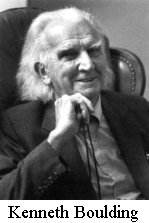 In a prescient essay, recognizing that growth cannot continue indefinitely in a world of finite
resources, economist Kenneth E. Boulding likened planet Earth to a spaceship (Boulding 1966).
Others, including Ward (1966) and Buckminster Fuller (2008) have extended this metaphor.
Our current economic system is fatally flawed and doomed to failure because it is based on the
principle of a chain letter,
i. e. a Ponzi scheme. Coupling such insane economics with runaway
greed results in recessions and leads to economic depression. We need to overhaul our economic
system and move towards an equilbrium if we ever hope to reach a stable sustainable state.
In a prescient essay, recognizing that growth cannot continue indefinitely in a world of finite
resources, economist Kenneth E. Boulding likened planet Earth to a spaceship (Boulding 1966).
Others, including Ward (1966) and Buckminster Fuller (2008) have extended this metaphor.
Our current economic system is fatally flawed and doomed to failure because it is based on the
principle of a chain letter,
i. e. a Ponzi scheme. Coupling such insane economics with runaway
greed results in recessions and leads to economic depression. We need to overhaul our economic
system and move towards an equilbrium if we ever hope to reach a stable sustainable state.
Together, the atmosphere and the oceans control climate. Ocean currents act as conveyor belts moving heat away from the equator. Changes in ocean currents drastically affect climate. We are now facing a dramatic and rapid anthropogenic change in global climate -- humans have broken the life support systems of this our one and only spaceship. When coupled with massive habitat loss and fragmentation due to human overpopulation, all denizens of planet Earth are potentially imperiled. 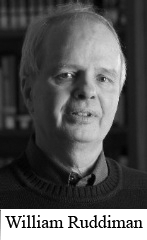 With the advent of human agriculture and city states about 10,000 years ago, humans began large
scale deforestation. Human activities, primarily deforestation,
began to alter atmospheric carbon
dioxide and methane levels many centuries ago, long before the industrial revolution (Ruddiman
2003, 2005). Oxygen isotopes in air samples from ice cores from the Antarctic and Greenland dating
back for more than 400,000 years have allowed inference of temperature changes over most of the
last half a million years. Four prolonged ice ages are evident. These changes are caused largely
by periodic fluctuations in Earth's orbit and the inclination of its axis known as the
With the advent of human agriculture and city states about 10,000 years ago, humans began large
scale deforestation. Human activities, primarily deforestation,
began to alter atmospheric carbon
dioxide and methane levels many centuries ago, long before the industrial revolution (Ruddiman
2003, 2005). Oxygen isotopes in air samples from ice cores from the Antarctic and Greenland dating
back for more than 400,000 years have allowed inference of temperature changes over most of the
last half a million years. Four prolonged ice ages are evident. These changes are caused largely
by periodic fluctuations in Earth's orbit and the inclination of its axis known as the
 Milankovitch cycles.
Four spikes in temperature were spaced approximately every 100,000+ years. Earth is presently in a
warm interglacial phase, and through burning of fossil fuels, deforestation, and loss of soil and
peat carbon, carbon dioxide levels have increased to well above any that have occurred over
the last 400,000 years. The last thermal spike has been prolonged for considerably longer than
the three preceding ones. Earth should be entering a colder glacial period but has stayed warm for
roughly the last 10,000 years
("The Long Summer" Fagan 2004).
An ice age seems overdue (Ruddiman 2003, 2007).
Milankovitch cycles.
Four spikes in temperature were spaced approximately every 100,000+ years. Earth is presently in a
warm interglacial phase, and through burning of fossil fuels, deforestation, and loss of soil and
peat carbon, carbon dioxide levels have increased to well above any that have occurred over
the last 400,000 years. The last thermal spike has been prolonged for considerably longer than
the three preceding ones. Earth should be entering a colder glacial period but has stayed warm for
roughly the last 10,000 years
("The Long Summer" Fagan 2004).
An ice age seems overdue (Ruddiman 2003, 2007).
This extended 100 century long warm period corresponds to the invention of agriculture and the resulting surge in human population and, based on current evidence, is almost certainly due to anthropogenic activities, especially deforestation and burning of fossil fuels. The rate of global warming is accelerating because long frozen reserves of methane are now being released into the atmosphere (in terms of the greenhouse effect, each molecule of methane is equivalent to about 25 molecules of carbon dioxide). When a molecule of methane burns, it gives off heat and is oxidized into 2 molecules of water and one of carbon dioxide, both of which are powerful greenhouse gases. Sudden surges in atmospheric methane have been implicated as the causes of past mass extinctions dated at about 55 and 251 million years ago. Long frozen fossil methane is now being released from rapidly thawing permafrost and from the deep oceans at an ever accelerating rate. Fracking releases large amounts of methane into the atmosphere as well. As temperatures rise, more methane bubbles up to the surface, further raising temperatures in an ever-increasing positive feedback loop. A tipping point has probably already been reached at which climate cannot return to pre-industrial conditions. Eventually, of course, the Milankovitch cycles will generate another ice age, but that could be many millennia from now. Weather is driven by the thermal differential between the surface and atmosphere versus that of outer space, which remains cold and constant. As Earth warms, this energy gradient increases and climate goes into convulsions -- droughts and heat spells are intensified and storms become more intense. With the melting of glaciers and ice caps, more water enters the atmosphere, changing the hydrological cycle. Ice is white and reflects solar energy whereas darker open water absorbs it, producing a powerful positive feedback loop that continually enhances global warming. We can expect more flooding, more tornados, bigger and more frequent hurricanes and monsoons. Weather is rapidly becoming more variable and more extreme. The exact timetable for these changes is uncertain, but data and current events suggest that climate changes have taken place during human lifetimes. A tipping point, or point of no return, has already been reached. Climate change includes not only temperature but also has dramatic effects on the amount and periodicity of precipitation, producing both droughts and floods locally. Human activities, especially the enhanced greenhouse effect, but also including burning of fossil fuels and even the waste heat produced by nuclear reactors, have added greatly to our already overheated spaceship. Glaciers are melting, and sea levels have risen by a foot since 1900 and are rising by over 3 mm per year (Kemp et al. 2009). The high specific heat of water has helped to moderate this increased heat load to some extent, resulting in the world's oceans warming by nearly a full degree Celsius over the past half century. The oceans also absorb methane and carbon dioxide, forming carbonic acid, which threatens all marine ecosystems and leads to acidification and the bleaching of coral reefs (Domino Effects). Despite frequent outcries that global warming is some sort of hoax, the vast majority of experts are convinced that it is a real and enduring threat. Watch this NASA video! If current trends continue, the planet will be at least 1-2° C warmer by 2050 (IPPC 2007, NOAA 2012). Moreover, the rate of climate change seems to be ever increasing and appears to be irreversible. 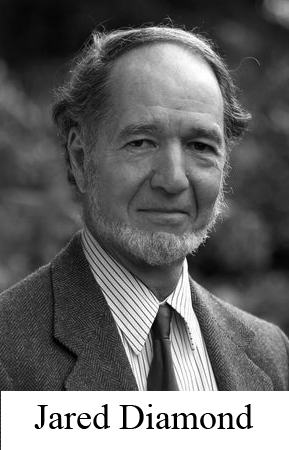 Until the advent of agriculture, humans were hunter gatherers -- many fewer of us existed. Food
supplies lead population -- populations tend to increase to the level that foods will allow.
Agriculture has been called "the worst mistake in the history of the human race"
(Diamond 1987)
because it allowed us to increase in population density to current unsustainable levels,
ultimately leading to the present day overpopulation crisis
Until the advent of agriculture, humans were hunter gatherers -- many fewer of us existed. Food
supplies lead population -- populations tend to increase to the level that foods will allow.
Agriculture has been called "the worst mistake in the history of the human race"
(Diamond 1987)
because it allowed us to increase in population density to current unsustainable levels,
ultimately leading to the present day overpopulation crisis
 (Catton 1982). We could never have reached
7 billion without fossil fuels. Just as supplies of bird and bat guano began to be exhausted,
the Haber-Bosch process rescued
agriculture by using methane to fix atmospheric nitrogen and produce virtually unlimited amounts
of ammonium nitrate (Smil 2001), which is an explosive as well as a fertilizer.
Without this technological "advance", neither Germany nor Japan could ever have gone to war --
Moreover, humans would have been limited by food supplies at much lower population densities.
Basically, humans exploited these one-time fossil energy reserves to demolish many of Earth's
natural ecosystems and turn them into arable land and crops to feed increasing numbers of people.
We turned the tall grass prairies of North America into fields of corn and wheat and replaced
bison herds with cattle, ultimately into masses of humanity. Of course, without agriculture
and fossil fuels, we could never have built cities, let alone developed our civilization and
human knowledge. However, in many ways our cities are little more than giant but fragile feed
lots supporting unsustainably dense aggregations of people. Without a steady inflow of food,
water, and power and a continual outflow of garbage and sewage, cities will collapse. We missed
our chance to live in a sustainable world.
(Catton 1982). We could never have reached
7 billion without fossil fuels. Just as supplies of bird and bat guano began to be exhausted,
the Haber-Bosch process rescued
agriculture by using methane to fix atmospheric nitrogen and produce virtually unlimited amounts
of ammonium nitrate (Smil 2001), which is an explosive as well as a fertilizer.
Without this technological "advance", neither Germany nor Japan could ever have gone to war --
Moreover, humans would have been limited by food supplies at much lower population densities.
Basically, humans exploited these one-time fossil energy reserves to demolish many of Earth's
natural ecosystems and turn them into arable land and crops to feed increasing numbers of people.
We turned the tall grass prairies of North America into fields of corn and wheat and replaced
bison herds with cattle, ultimately into masses of humanity. Of course, without agriculture
and fossil fuels, we could never have built cities, let alone developed our civilization and
human knowledge. However, in many ways our cities are little more than giant but fragile feed
lots supporting unsustainably dense aggregations of people. Without a steady inflow of food,
water, and power and a continual outflow of garbage and sewage, cities will collapse. We missed
our chance to live in a sustainable world.
Human populations have grown exponentially over the past century, doubling each generation. Our economic system, based on runaway greed and the principle of a chain letter -- growth, growth, and more growth, is fundamentally flawed. Ponzi schemes like this only work briefly, until the cost of recruiting resources needed to sustain them exceeds the value they represent. We are far overextended in terms of local resource bases already, and approaching limits in things transported from afar, such as quality timber, larger fishes and some minerals. As transport costs rise, bulky and heavy items (such as metal ores) will become regionally scarce, until eventually transport becomes a limiting factor. The prevalent attitude that no limits exist in a finite world is obviously insane, but somehow it has become politically incorrect even to allude to overpopulation. Not wanting to face reality, people are locked in denial that such a problem could even exist. And yet, population pressures clearly underlie and drive almost all of the many challenges we face, from energy and food shortages to political unrest and climate change. Some are convinced that technology will come to our rescue, but so far it has only led us farther out on thin ice. Many think that the solution to the energy crisis is access to more energy, but that will only exacerbate the planet's heat load and accelerate the rate of global warming. Even engineers who should know better seem to think humans can ignore the second law of thermodynamics. Hundreds of species, especially megafauna, in many different taxa went extinct during the transition from the Pleistocene to the present day. Possible causes of this "Quaternary extinction event" (Koch and Barnosky 2006) include climate change and overkill by human hunters as people migrated to many previously uninhabited regions in the New World and Australia during the late Pleistocene and Holocene. Humans first reached Australia about 50,000 years ago but did not get to the Americas until about 13,000+ years ago. Massive extinctions followed soon thereafter on both continents, strongly suggesting that anthropogenic activities were involved. Fossil records show that Pleistocene extinctions following human invasions were extensive and among others included many large mammals, such as mammoths, mastodons, chalicotheres, gomphotheres, pampatheres, glyptodonts, many ungulates, saber-toothed cats, cave lions, cave bears, diprotodonts, several marsupial carnivores, lemurs, as well as various apes including other humans. Some birds that perished include giant South American Adzebills and huge Australian emu-like Dromornithids. A more recent wave of extinctions followed human colonization of many islands, including the Caribbean and Galápagos Archipelagos, Indian Ocean islands, Hawaii, New Caledonia and other Pacific islands, Madagascar, islands of the Mediterranean, and New Zealand. Many flightless island birds, including dodos and moas, went extinct (Steadman 2006), as did other island endemics such as land tortoises. An even greater massive anthropogenic extinction event is currently underway ("The Sixth Extinction"). 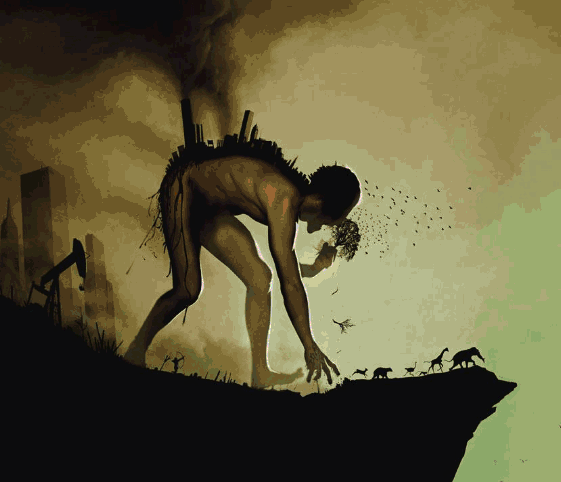
Many people embrace the anthropocentric attitude that Earth and all its resources exist solely for human benefit and consumption. Organized religions teach mastery of nature and by setting people above all else, they have led to many of our worst ecological abuses. For example, the Bible says "be frutiful and multiply, and have dominion over the fish of the sea, and over the fowl of the air, and over every living thing that moveth upon the earth" (Genesis I, 28). We have overpopulated the planet, overfished the world's oceans and decimated many birds and other species. Humans are eating themselves right off this planet into worldwide famine. We have raped and pillaged this planet for anything and everything it can offer. Millions of other denizens of spaceship Earth evolved here just as we did and are integral functional components of natural ecosystems. All life on Earth requires space to live -- other Earthlings have as much right to exist on this planet as people do. We need to embrace bioethics and we must learn to share. Humanity has a fatal disease - its symptoms include runaway greed, our insane economic system, denial, starvation, unburnable oil, global warming, the wobbling polar jet stream, selfish corporations and ineffective corrupt government. Humans are rapidly destroying our one and only spaceship's life support systems: Earth's atmosphere and oceans, commons we all must share, are threatened, perhaps irreparably. Faith in rapture and/or technology will not save us from human nature. If humans are to survive, we must confront reality and find ways to control human instincts, including our greed, tribal loyalties, and our innate urge to procreate. Our descendants, if any, will have to live much more frugally and spread out than we have.  The current lengthy worldwide economic recession is just the beginning of the end of the comfortable existence we enjoyed so much in the past. I wouldn't want to be a youngster facing the dismal future. The saddest thing is that humans could have been almost God-like stewards of our one and only spaceship. Earth was pretty durable, we could have kept it a nice liveable place for all our fellow Earthlings for many millennia to come, but instead we got into the life support center and trashed it, breaking everything we could (especially the atmosphere and oceans). The enormous disparity between what humans could have been and what we in fact are is just plain tragic. 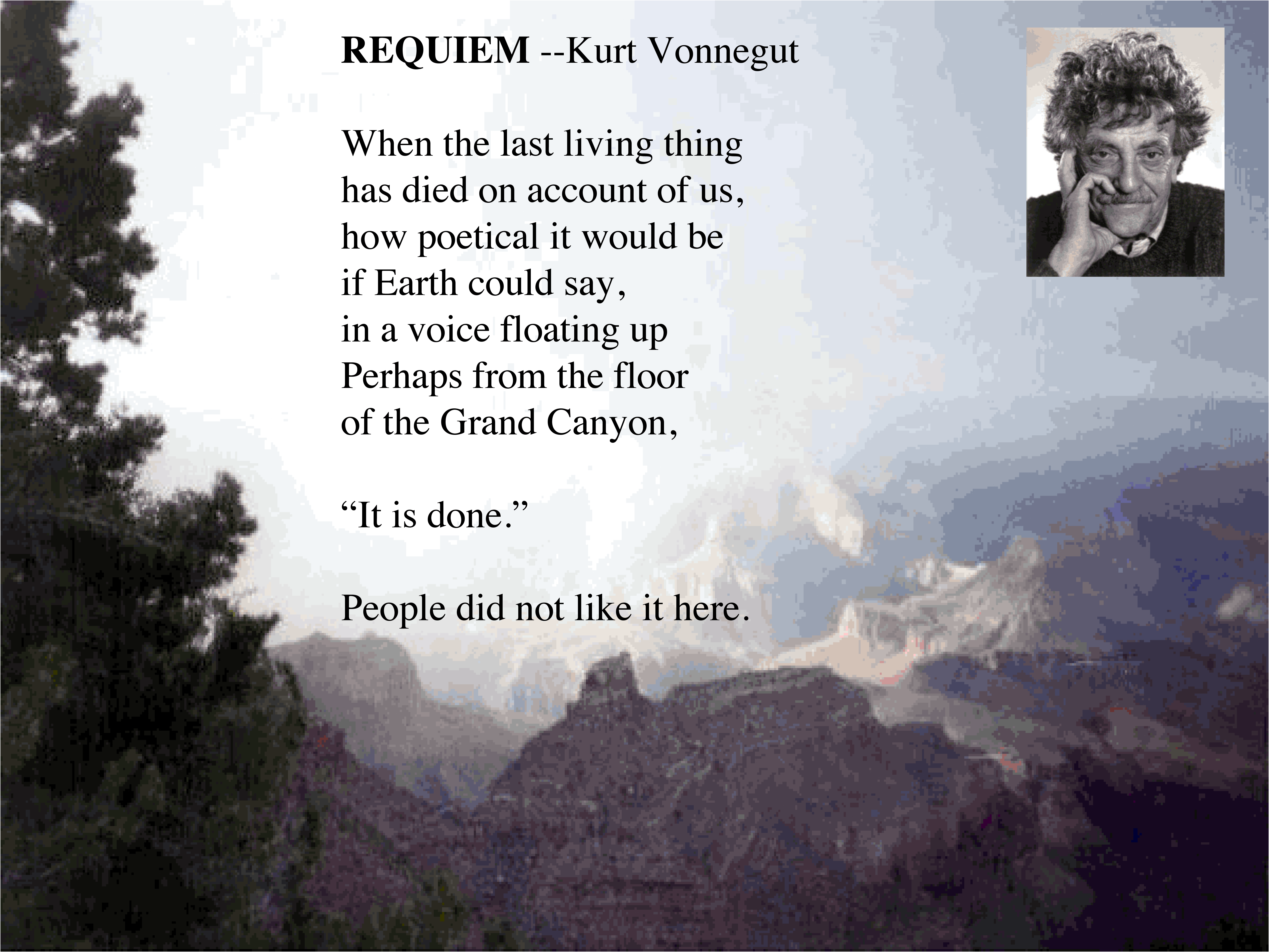
Read Can Humans Share Spaceship Earth? Watch Why Can't We Humans Share Spaceship Earth? (PPT - takes a while to load) Can Human Instincts Be Controlled? Selection for Uncaring Humanoids Humans are committing suicide NASA video: An Amazing Planet Average Temperatures 1884-2012 (40 seconds) NASA video on Earth's Water Cycle NASA video on Impact of the Oceans on Climate NASA video on Diminishing Sea Ice 1980-2012 Watch ERP's "Domino Effects" (6.5 minutes) Video on exponential growth by David Suzuki: Now I am scared (3.5 minutes) Watch ABC News's Earth 2100 (83 minutes) References Balfour, L. E. 1895. Foundations of Belief. Boulding, K. E. 1966. The Coming Spaceship Earth Buckminster Fuller, R. 1968. Operating Manual for Spaceship Earth. New York: E.P. Dutton & Co. Catton, W. R. 1982. Overshoot. The Ecological Basis of Revolutionary Change. University of Illinois Press. Excerpt Corning, P. A. 2004. Plan for Spaceship Earth Diamond, J. 1987. The Worst Mistake in the History of the Human Race Fagan B. M. 2004. The Long Summer: How Climate Changed Civilization. Basic Books. Hansen, J. et al. 2005. Earth's Energy Imbalance: Confirmation and Implications. Science 308: 1431-1435. Download pdf. Hardin G. 1968. The tragedy of the commons. Science 162:1243-1248. Download pdf. IPPC 2007. Contribution of Working Group I to the Fourth Assessment Report of the Intergovernmental Panel on Climate Change, 2007. Solomon, S., D. Qin, M. Manning, Z. Chen, M. Marquis, K.B. Averyt, M. Tignor and H.L. Miller (eds.). Cambridge Univ. Press, Camabridge, United Kingdom and New York, NY, USA. Kemp AC, Horton BP, Culver SJ, Corbett DR,Van de Plassche O, Gehrels WR, Douglas BC, and Parnell AC. 2009. Timing and magnitude of recent accelerated sea-level rise (North Carolina, United States) Geology 37:1035-1038. Koch P. I. and A. D. Barnosky. 2006. Late Quaternary Extinctions: State of the Debate. Ann. Rev. Ecol. Syst. 37:215-50. Mill, J. S. 1859. On Liberty. Ticknor and Fields, Boston. Read Mill's The Art of Living Morrison, R.1999. The Origin of Faith. From "The Spirit in the Gene". Cornell Univ. Press. 
Nadeau, R. 2008. The Economist has No Clothes. Scientific American, April 2008. Nadeau, R. 2008. Brother, Can You Spare Me a Planet? Scientific American, April 2008. NOAA. 2012. Global Warming. Oreskes, N. and E. M. Conway 2014. The Collapse of Western Civilization: A View from the Future, Columbia University Press. Pianka: Space Travel Pianka: Intelligent Design? Pianka: The Weakest Link Pianka: Natural Selection Pianka: Overpopulation: The Real Crisis Pianka: Can Humans Share Spaceship Earth? Pianka: Can Human Instincts Be Controlled? Download pdf Pianka: Selection for Uncaring Humanoids Pianka: The Vanishing Book of Life an html file (view with Safari). Download The Vanishing Book of Life, the now infamous speech I have given many times (16.8 meg pdf file) and read it for yourself. Download a smaller version (words only) of the Text only (284 KB pdf file). Ruddiman, W. F. 2003. The anthropogenic greenhouse era began thousands of years ago. Climatic Change 61: 261-293. Ruddiman, W. F. 2007. Plows, Plagues, and Petroleum. Princeton University Press. Smil, V. 2001. Enriching the Earth: Fritz Haber, Carl Bosch and the Transformation of World Food Production, The MIT Press, Cambridge, xvii + 411 p Steadman D. W. 2006. Extinction and Biogeography of Tropical Pacific Birds. The University of Chicago Press, Chicago. Vonnegut, Kurt: Requiem Ward, B. 1966. Spaceship Earth, Columbia University Press. Wood, M. C. 2013. Nature's Trust. Cambridge University Press. Zency, Eric. 2009. Mr. Soddy's Ecological Economy. New York Times, April 12, 2009. Last updated 22 May 2012 by Eric R. Pianka hits |